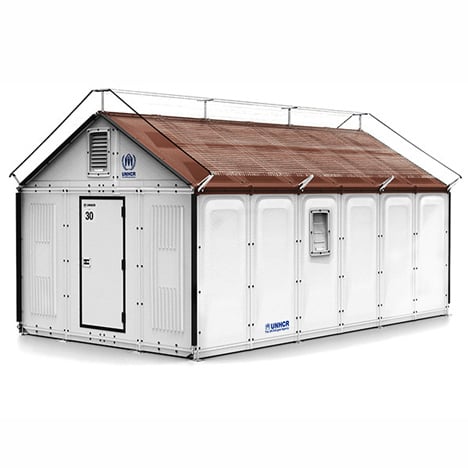News: furniture giant IKEA has used its expertise in flat-pack design to redesign refugee shelters.
The IKEA Foundation has been working with the UN Refugee Agency (UNHCR), which currently houses displaced people in traditional canvas ridge tents or more modern hoop tents, neither of which provide insulation or last more than a few months.
"Many of the current shelters used in refugee camps have a life span of approximately six months before the impact of sun, rain and wind means it needs to be replaced. Yet long-term refugee situations mean that, on average, refugees stay in camps for 12 years," says IKEA.
Designed to last three years, the prototype shelter from IKEA is a shed-like structure made of lightweight polymer panels, laminated with thermal insulation, which clip onto a steel frame.
The shelters take four hours to assemble and come flat-packed with panels, pipes, connectors and wires in cardboard boxes just like an IKEA bookcase.
There's also a textile sheet with aluminium woven into the material that lays over the roof, reflecting the sun during the day and keeping heat in at night. A solar panel laminated on a thin plastic film powers built-in lights and a USB outlet.
At 17.5 square metres, the shelter is twice as large as a traditional refugee tent and each one accommodates five people. The upright walls mean the structure could be upgraded over time, for example by adding earth walls or a metal roof.
The firm hopes they could be made for around £655 each once in mass production. IKEA's Refugee Housing Unit is manufacturing 50 trial shelters to be tested in Ethiopia, Iraq and Lebanon.
Other stories about disaster relief on Dezeen include post-tsunami housing by Shigeru Ban, the reconstruction of a refugee camp outside Tripoli in Lebanon and Brad Pitt's Make it Right project where architects including Frank Gehry, Morphosis and MVRDV are designing homes for New Orleans following Hurricane Katrina in 2005.
IKEA also recently announced it will produce miniature versions of its most popular products as dolls' house furniture and that its founder Ingvar Kamprad is stepping down after 70 years at the helm. Last year the firm apologised for selling products manufactured by East German political prisoners in the 1970s and 1980s.
See all our stories about disaster relief »
See all our stories about IKEA »

